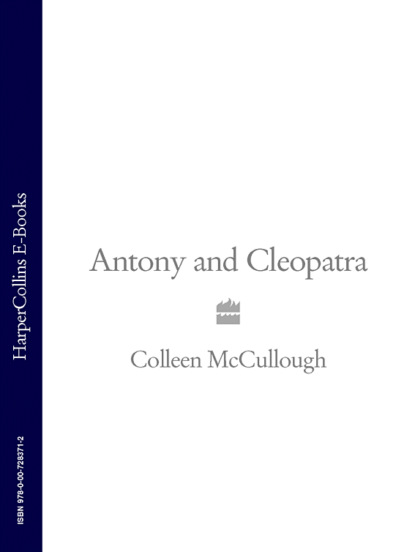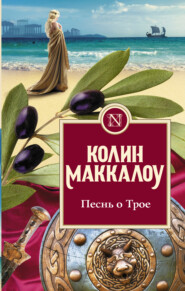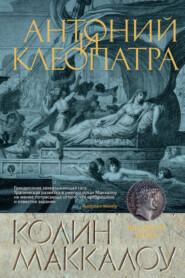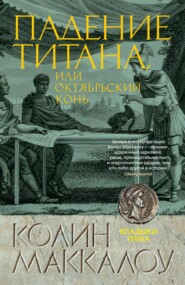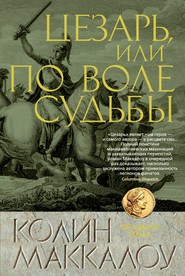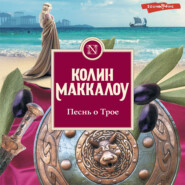По всем вопросам обращайтесь на: info@litportal.ru
(©) 2003-2024.
✖
Antony and Cleopatra
Автор
Год написания книги
2019
Настройки чтения
Размер шрифта
Высота строк
Поля
Embarrassed, Pollio passed the compliment off tactfully but lightly by turning to greet the third member of the team, Lucius Cocceius Nerva. Neutral? How could such a neutral man be anything else? No wonder his wife ruled him.
Over a dinner of eggs, salads, chicken and crunchy fresh bread, Pollio found himself liking Maecenas, who seemed to have read everybody from Homer to Latin luminaries like Caesar and Fabius Pictor. If there was one thing lacking in any army camp, he reflected, it was an in-depth conversation about literature.
‘Of course Virgil is Hellenistic in style, but then, so was Catullus – oh, what a poet!’ said Maecenas with a sigh. ‘I have a theory, you know.’
‘What?’
‘That the most lyrical exponents of poetry or prose all have some Gallic blood. Either they come from Italian Gaul or their ancestors did. The Celtae are a lyrical people. Musical too.’
‘I agree,’ said Pollio, relieved to find no sweeties on the menu. ‘Leaving aside “Iter” – a remarkable poem! – Caesar is typically unpoetical. Exquisite Latin, yet bald and spare. Aulus Hirtius had been with him long enough to do a fair imitation of his style in the commentaries Caesar didn’t live to write, but they lack the master’s deftness. However, Hirtius does give some things away that Caesar never would have. Like what drove Titus Labienus to defect to Pompeius Magnus after the Rubicon.’
‘Never a boring writer, though.’ Maecenas giggled. ‘Ye gods, what a bore Cato the Censor is! Like being forced to listen to the maiden speech of a political hopeful mounting the rostra.’
They laughed together, at ease with each other, while Nerva the Neuter, as Maecenas had named him, dozed gently.
On the morrow they got down to business, in a rather bleak room furnished with a large table, two wooden chairs with backs but no arms, and an ivory curule chair. Seeing it, Pollio blinked.
‘It’s yours,’ said Maecenas, taking a wooden chair and directing Nerva to the other, which faced it. ‘I know you haven’t assumed it yet, but your rank as junior consul of the year demands that you chair our meetings, and you should sit on ivory.’
A nice and very diplomatic touch, thought Pollio, seating himself at the head of the table.
‘If you want a secretary present to take the minutes, I have a man,’ Maecenas went on.
‘No, no, we’ll do this alone,’ Pollio said. ‘Nerva will act as secretary and take the minutes. Can you do shorthand, Nerva?’
‘Thanks to Cicero, yes.’ Looking pleased at having something to do, Nerva put a stack of blank Fannian paper under his right hand, chose a pen from among a dozen, and discovered that someone had thoughtfully dissolved a cake of ink.
‘I’ll start by summarizing the situation,’ Pollio said crisply. ‘Number one, Marcus Antonius is not satisfied that Caesar Octavianus is fulfilling his duties as a Triumvir. A, he has not ensured that the people of Italia are well-fed. B, he has not suppressed the piratical activities of Sextus Pompeius. C, he has not settled enough retired veterans on their portions of land. D, Italia’s merchants are suffering through hard times for business. E, Italian landowners are angry at the draconian measures he has adopted to separate them from their land in order to settle the veterans. F, more than a dozen towns throughout Italia have been illegally stripped of their public lands, again in order to settle veterans. G, he has raised taxes to an intolerable height. And H, he is filling the Senate with his own minions.
‘Number two, Marcus Antonius is not satisfied at the way Caesar Octavianus has usurped the governance and legions of one of his provinces, Further Gaul. Both governance and legions are at the command of Marcus Antonius, who should have been notified of the death of Quintus Fufius Calenus and allowed to appoint the new governor, as well as dispose of Calenus’s eleven legions as he sees fit.
‘Number three, Marcus Antonius is not satisfied at the waging of a civil war inside Italia. Why, he asks, did not Caesar Octavianus solve his difference of opinion with the late Lucius Antonius in a peaceful way?
‘Number four, Marcus Antonius is not satisfied at being refused entry to Italia through Brundisium, its major Adriatic port, and doubts that Brundisium defied Italia’s resident Triumvir, Caesar Octavianus. Marcus Antonius believes that Caesar Octavianus issued orders to Brundisium to exclude his colleague, who is not only entitled to enter Italia, but also entitled to bring legions with him. How does Caesar Octavianus know that these legions have been imported for the purposes of war? They might as easily be going to retirement.
‘Number five, Marcus Antonius is not satisfied that Caesar Octavianus is willing to allow him to recruit new troops inside Italia and Italian Gaul, as he is lawfully entitled to do.
‘That is all,’ Pollio concluded, having said every word of that without reference to notes.
Maecenas had listened impassively while Nerva scribbled away – to some effect, apparently, since Nerva didn’t ask Pollio to repeat any of what he had said.
‘Caesar Octavianus has faced untold difficulties in Italia,’ Maecenas said in a quiet, pleasant voice. ‘You will forgive me if I do not tabulate and enumerate in your own succinct style, Gnaeus Pollio. I am not governed by such merciless logic – my style inclines toward storytelling.
‘When Caesar Octavianus became the Triumvir of Italia, the Islands and the Spains, he found the Treasury empty. He had to confiscate or buy sufficient land upon which to settle over one hundred thousand retired veteran soldiers. Two million iugera! So he confiscated the public lands of the eighteen municipia that had supported Divus Julius’s killers – a fair and just decision. And whenever he acquired any money, he bought land from the proprietors of latifundia, on the premise that these individuals were behaving exploitatively by grazing vast areas once under the plough for wheat. No grower of grain was approached, for Caesar Octavianus planned to see a great increase in locally grown grain once these latifundia were split up as allotments for veterans.
‘The relentless depradations of Sextus Pompeius had deprived Italia of wheat grown in Africa, Sicilia and Sardinia. The Senate and People of Rome had grown lazy about the grain supply, assuming that Italia could always be fed on grain grown overseas. Whereas Sextus Pompeius has proved that a country relying on the importation of wheat is vulnerable, can be held to ransom. Caesar Octavianus doesn’t have the money or the ships to drive Sextus Pompeius off the high seas, nor to invade Sicilia, his base. For that reason he concluded a pact with Sextus Pompeius, even going as far as marrying Libo’s sister. If he has taxed, it is because he has no alternative. This year’s wheat is costing thirty sesterces the modius from Sextus Pompeius – wheat already bought and paid for by Rome! From somewhere, Caesar Octavianus has to find forty million sesterces every month – imagine it! Nearly five hundred million sesterces a year! Paid to Sextus Pompeius, a common pirate!’ cried Maecenas so earnestly that his face reflected a rare passion.
‘Over eighteen thousand talents,’ said Pollio thoughtfully. ‘And of course the next thing you’re going to say is that the silver mines of the Spains were just beginning to produce when King Bocchus invaded, so now they’re closed again and the Treasury beggared.’
‘Precisely,’ said Maecenas.
‘Taking that as read, what happens next in your story?’
‘Rome has been dividing up land on which to settle first the poor and then the veterans since the time of Tiberius Gracchus—’
‘I’ve always thought,’ Pollio interrupted, ‘that the worst sin of omission the Senate and People committed was to refuse to give Rome’s retiring veterans a pension over and above what’s banked for them out of their pay. When consulars like Catulus and Scaurus denied Gaius Marius’s propertyless Head Count soldiers a pension, Marius rewarded them with land in his name. That was sixty years ago, and ever since the veterans have looked to their commanders for reward, not to Rome herself. A terrible mistake. It gave the generals power they should never have been allowed to have.’
Maecenas smiled. ‘You’re telling my story for me, Pollio.’
‘I beg your pardon, Maecenas. Continue, please.’
‘Caesar Octavianus cannot free Italia from Sextus without help. He has begged that help from Marcus Antonius many times, but Marcus Antonius is either deaf or illiterate, for he doesn’t answer those letters. Then came internal war, a war that was not provoked in any way by Caesar Octavianus! He believes that the true instigator of Lucius Antonius’s rebellion – for so it seemed to those of us in Rome – was a freedman named Manius, in the clientele of Fulvia. Manius convinced Fulvia that Caesar Octavianus was – er – stealing Marcus Antonius’s birthright. A very strange accusation that she believed. In turn, she persuaded Lucius Antonius to use the legions he was recruiting on Marcus Antonius’s behalf and march on Rome. I don’t think it’s necessary to say anymore on the subject, save to assure Marcus Antonius that his brother was not prosecuted, but allowed to assume his proconsular imperium and go to govern Further Spain.’
Fishing through a number of scrolls near him, Maecenas found one, and flourished it. ‘I have here the letter that Quintus Fufius Calenus’s son wrote, not to Marcus Antonius, as he should have, but to Caesar Octavianus.’ He handed it to Pollio, who read it with the ease of a highly literate man. ‘What Caesar Octavianus saw in it was alarming, for it betrayed Calenus Junior’s weakness and lack of decision. As a veteran of Further Gaul, Pollio, I’m sure I do not have to tell you how volatile the long-haired Gauls are, and how quick they are to scent an uncertain governor. For this reason and this reason alone, Caesar Octavianus acted swiftly. He had to act swiftly. Knowing that Marcus Antonius was a thousand miles farther away, he took it upon himself to travel immediately to Narbo, there to install a temporary governor, Quintus Salvidienus. Calenus’s eleven legions are exactly where they were – four in Narbo, four in Agedincum, and three in Glanum. What did Caesar Octavianus do wrong in acting thus? He acted as a friend, a fellow Triumvir, the man on the spot.’
Maecenas sighed, looked rueful. ‘I daresay that the most truthful charge that can be laid against Caesar Octavianus is that he found himself unable to control Brundisium, which was ordered to allow Marcus Antonius to come ashore together with as many legions as he cared to bring to their homeland, be it for a nice vacation or retirement. Brundisium defied the Senate and People of Rome, it is as simple as that. What Caesar Octavianus hopes is that he will be able to persuade Brundisium to cease its defiance. And that is all,’ Maecenas concluded, smiling sweetly.
At which point the arguments began, but not with passion or rancor. Both men knew the truth of every matter raised, but both men also knew that they had to be loyal to their masters, and had decided the best way to do the latter was to argue convincingly. Octavian for one would read Nerva’s minutes closely, and if Mark Antony did not, he would at least pump Nerva about the meeting.
Finally, just before the Nones of October, Pollio decided he had had enough.
‘Look,’ he said, ‘it’s clear to me that the way things were arranged after Philippi was slipshod and ineffective. Marcus Antonius was full of his own importance, and despised Octavianus for his conduct at Philippi.’ He rounded on Nerva, beginning to scribble. ‘Nerva, don’t you dare write down a word of this! It’s time to be frank, and as great men don’t like frankness, it’s best we don’t tell them. That means you can’t let Antonius bully you, hear me? Spill the beans about this, and you’re a dead man – I will kill you myself, understand?’
‘Yes!’ squeaked Nerva, dropping his pen in a hurry.
‘I adore it!’ said Maecenas, grinning. ‘Proceed, Pollio.’
‘The Triumvirate is ridiculous as it stands at the moment. How did Antonius ever think he could be in several places at once? For that’s what happened after Philippi. He wanted the lion’s share of everything, from provinces to legions. So what emerged? Octavianus inherits the grain supply and Sextus Pompeius, but no fleets to put Sextus down, let alone transport an army capable of taking Sicilia. If Octavianus was a military man, which he is not, nor ever claimed to be, he would have known that his freedman Helenus – obviously a persuasive fellow – couldn’t take Sardinia. Mostly because Octavianus doesn’t have enough troop transports. He’s shipless. The provinces were allocated in the most muddle-headed way imaginable. Octavianus gets Italia, Sicilia, Sardinia, Corsica, Further and Nearer Spain. Antonius gets the entire East, but that isn’t enough for him. So he takes all the Gauls as well as Illyricum. Why? Because the Gauls contain so many legions still under the Eagles and not wishful of retiring. I know Marcus Antonius very well, and he’s a good fellow, brave and generous. When he’s at the top of his form, no one is more capable or clever. But he’s also a glutton who can’t curb his appetite, no matter what it is he fancies devouring. The Parthians and Quintus Labienus are running amok all over Asia and a good part of Anatolia. But here we sit, outside Brundisium.’
Pollio stretched, then hunched his shoulders. ‘It’s our duty, Maecenas, to even things up and out. How do we do that? By drawing a line between West and East, and putting Octavianus on one side of it, and Antonius on the other. Lepidus can have Africa, that goes without saying. He’s got ten legions there, he’s safe and secure. You’ll get no arguments from me that Octavianus has by far the harder task because he has Italia: impoverished, worn out and hungry. Neither of our masters has any money. Rome is close to bankruptcy, and the East so exhausted it can’t pay any significant tributes. However, Antonius can’t have things all his way, and he has to be made to see that. I propose that Octavianus be given a better income by governing all the West – Further Spain, Nearer Spain, Further Gaul in all its parts, Italian Gaul, and Illyricum. The Drina River is a natural frontier between Macedonia and Illyricum, so it will become the border between West and East. It goes without saying that Antonius will be as free to recruit troops in Italia and Italian Gaul as Octavianus. Italian Gaul, incidentally, should become a part of Italia in all respects.’
‘Good man, Pollio!’ Maecenas exclaimed, smiling broadly. ‘I couldn’t begin to say it as well as you just have.’ He gave a mock shiver. ‘For one thing, I wouldn’t have dared be so hard on Antonius. Yes, my friend, very well said indeed! Now all we have to do is persuade Antonius to agree. I don’t foresee any arguments from Caesar Octavianus. He’s had a terrible time of it, and of course the journey from Rome brought on his asthma.’
Pollio looked amazed. ‘Asthma?’
‘Yes. He almost dies of it. That’s why he hid in the marshes at Philippi. So much dust and chaff in the air!’
‘I see,’ Pollio said slowly. ‘I see.’
‘It’s his secret, Pollio.’
‘Does Antonius know?’
‘Of course. They’re cousins, he’s always known.’
‘How does Octavianus feel about letting the exiles come home?’
‘He won’t object.’ Maecenas seemed to consider something, then spoke. ‘You ought to know that Octavianus will never go to war against Antonius, though I don’t know whether you can convince Antonius of that. No more civil wars. He’ll hew to it, Pollio. That’s really why we’re here. No matter what the provocation, he won’t go to war against a fellow Roman. His way is diplomacy, the conference table, negotiations.’





